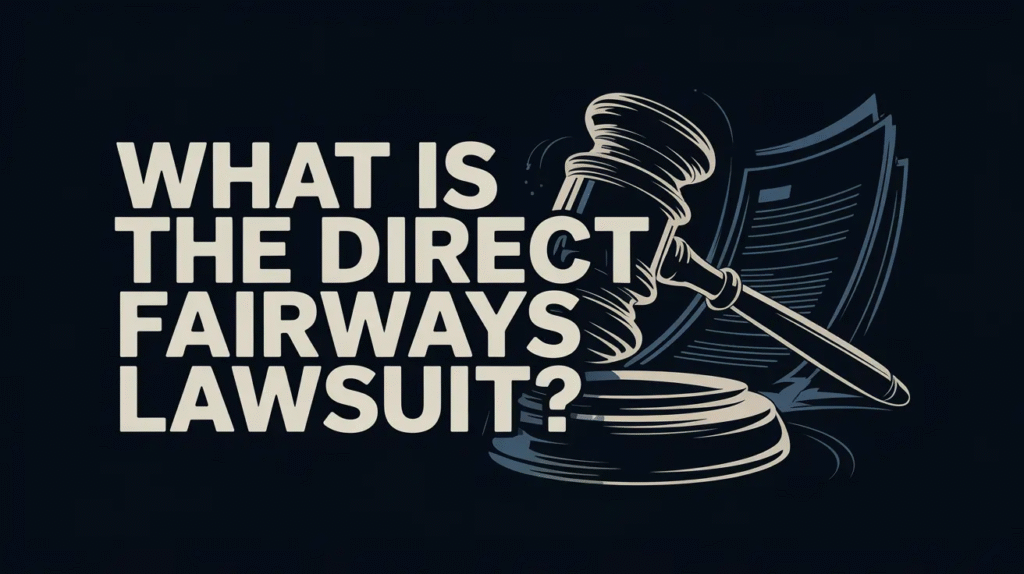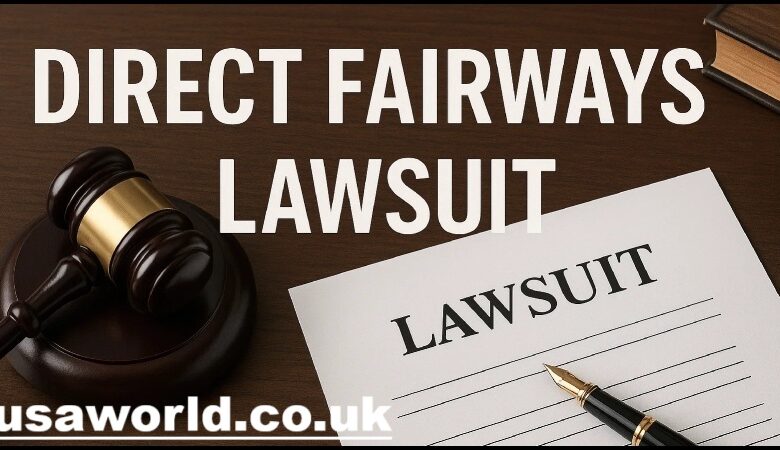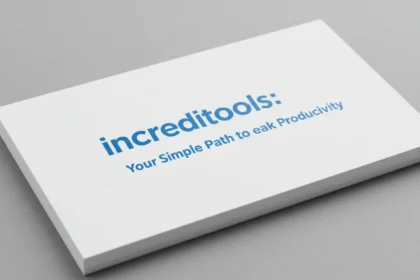Across the United States, more and more small business owners are raising serious concerns about a company called Direct Fairways. While some saw them as a helpful marketing solution for advertising on golf courses, others now claim they were misled, overcharged, or completely ignored after paying. The result? Dozens of official complaints, hundreds of angry online reviews, and now, an ongoing lawsuit that’s drawing attention from lawyers, media, and consumer watchdogs alike. In this article, we’ll break everything down in a simple and honest way so you know exactly what’s going on with the Direct Fairways lawsuit—no confusing legal talk, just facts.
What Is Direct Fairways?
Direct Fairways is a marketing company that operates in the United States, mostly promoting advertising opportunities at golf courses. Their business model is simple on the surface—they reach out to local businesses and offer ad placements on golf scorecards, tee signs, course guides, and other printed materials used by golfers. For businesses looking to get their name in front of a wealthier, golf-playing audience, this type of exposure might sound like a great idea. Golfers are typically seen as a valuable demographic, and being present on their local course seems like a smart way to grow brand awareness. That’s what Direct Fairways pitches in their sales calls, and many small business owners say the offer is attractive, especially when they’re told it’s affordable, easy, and offers long-term benefits.
The company is based in Arizona but works with businesses across the entire U.S., using remote sales teams to contact potential clients by phone. They often promise exclusivity at specific courses, stating that only one business per industry will be advertised at each location. Their marketing materials look professional, and they claim partnerships with hundreds of golf courses nationwide. But while their pitch may sound solid, a growing number of customers now say the service does not match the promises—and that’s where the legal trouble begins.
Why Is There a Lawsuit Against Direct Fairways?
The lawsuit against Direct Fairways stems from a growing wave of allegations made by business owners who feel deceived by the company’s sales tactics and billing practices. At the heart of the lawsuit is a series of accusations, including deceptive advertising, unauthorized charges, breach of contract, and refusal to refund payments. Several plaintiffs claim that they were pressured into signing contracts during high-pressure sales calls, only to realize later that the terms were very different from what was described over the phone. Others report being charged for services they never received or being locked into non-cancellable contracts despite being told otherwise.
Some of the legal filings allege that Direct Fairways uses scripted phone calls with vague contract terms, making it easy for sales reps to say one thing and deliver another. Business owners also claim that once they tried to cancel, they were ignored or redirected to departments that never responded. The lawsuits seek compensation for financial losses, court fees, and in some cases, punitive damages to discourage similar future behavior. What started as a few isolated complaints is now a much larger investigation involving consumer protection agencies in multiple states. These legal battles are not only affecting Direct Fairways’ reputation but also putting a spotlight on questionable practices in the broader golf course advertising industry.
What Are People Complaining About?
If you read through customer reviews, complaints on the Better Business Bureau (BBB), or consumer forums, you’ll find a pattern of issues that seem to appear over and over. These aren’t one-time problems or misunderstandings—they’re repeated concerns that are now part of the legal discussion surrounding the Direct Fairways lawsuit. Below are the three main areas of complaint.

Unexpected Charges
One of the most frustrating problems reported by customers is being charged more than they agreed to. Some businesses claim they were told they’d pay a one-time fee, only to discover monthly charges appearing on their bank statements later. Others say they were charged for add-ons or services that they never signed up for, such as premium course placement or design upgrades. Many were surprised by hidden setup fees or extended billing cycles that were never clearly disclosed during the sales pitch. In multiple cases, customers allege that Direct Fairways charged their accounts even after canceling. These unexpected charges have caused financial stress, especially for small business owners working with tight budgets.
No Refunds Given
Another common issue is the company’s strict or unclear refund policy. Many customers say they requested a refund after realizing the service didn’t meet expectations, but were either denied or completely ignored. Some were told they had a short cancellation window, while others were informed that “all sales are final.” There are even reports of customers never receiving the promised advertising materials—no printed scorecards, no signage, and no confirmation that their ad ever went live. Yet, despite this lack of service, refund requests were still rejected. This has left many clients feeling trapped and powerless, believing they were scammed out of hundreds or even thousands of dollars.
Misleading Sales Talk
Perhaps the most serious complaints involve what customers describe as dishonest or misleading sales pitches. Small business owners say they were rushed through the agreement process, told they were getting a limited-time deal, and pressured to sign up before fully understanding the terms. Some say sales reps claimed the contract could be canceled at any time, which later turned out to be false. Others were promised that their ad would appear at a specific golf course, only to learn later that the course was not part of the program—or worse, didn’t even know Direct Fairways existed. These misleading claims have been a central part of the lawsuit, with many arguing that they were intentionally misled into signing unfair contracts.
What Do Online Reviews Say About Direct Fairways?
A quick search for “Direct Fairways reviews” or “Direct Fairways complaints” will show you hundreds of negative posts on consumer review platforms like Trustpilot, Yelp, SiteJabber, and the BBB. Common themes in these reviews include poor communication, hidden fees, lack of results, and rude or unresponsive customer service. Some reviewers claim they were ghosted after asking for updates, while others say they never received any proof that their ad was actually used. A recurring complaint is that customers were promised exclusive advertising at a certain course but found out that several businesses from the same industry were being advertised at the same location. While a few customers claim they had an okay experience, the majority of online feedback is overwhelmingly negative. These poor reviews are often mentioned in legal complaints and used as evidence in lawsuits to demonstrate a pattern of unethical practices.
Is Direct Fairways a Scam?
While calling a business a “scam” is serious, many customers and critics now use that term when referring to Direct Fairways. Based on current allegations, legal documents, and customer experiences, it’s clear that something is not right. At the very least, the company appears to use aggressive and misleading sales tactics that leave customers confused and financially burdened. Whether or not it legally qualifies as fraud will be determined in court, but the combination of false advertising, no refunds, and unauthorized charges certainly points to unethical behavior. Consumer protection experts suggest caution when dealing with Direct Fairways or any company that pressures you into fast decisions without giving you time to review the contract. It’s also worth noting that the company is currently facing active lawsuits and investigations, which should be a red flag to anyone considering their services.
What Should You Do If You’re a Customer?
If you’ve already worked with Direct Fairways and feel misled or overcharged, you’re not alone. Many small business owners are now taking steps to protect themselves and seek compensation. Here’s what you should do.

Check Your Contract
Go back and review any documents or emails you received when you signed up. Look closely at the terms, payment schedules, refund policies, and cancellation clauses. If you feel that what was promised doesn’t match the contract—or if the contract was never fully explained—this could help you in any legal or financial action you decide to take.
Talk to a Lawyer
If you believe you’ve been scammed or unfairly charged, speaking with a consumer protection lawyer is a smart move. Many offer free consultations and can tell you right away whether you have a case. You may be able to join a class-action lawsuit or file your own claim for breach of contract or false advertising.
File a Complaint
You can file official complaints with the Federal Trade Commission (FTC), your state’s Attorney General’s office, and the Better Business Bureau. These complaints not only help you get your voice heard but also add to the legal record. The more complaints filed, the stronger the case becomes against companies that engage in shady business practices. You can also leave honest reviews online to warn others and share your experience publicly.
What Could Happen Next with the Lawsuit?
The Direct Fairways lawsuit is still unfolding, but there are several possible outcomes. The courts could order the company to pay refunds or damages to affected customers. In more serious cases, they could face fines, government restrictions, or even be shut down if found guilty of consumer fraud. Regulators are also reviewing their business practices, so new rules may be introduced to prevent future abuses. Whatever the result, the outcome of this lawsuit could set a precedent for how golf course marketing firms operate going forward.
The Bottom Line
The Direct Fairways lawsuit is a serious reminder to all small business owners to be cautious when entering into marketing agreements. What starts as a friendly phone call offering golf course advertising can quickly turn into a costly mistake if you’re not careful. With hundreds of complaints, poor online reviews, and ongoing legal action, Direct Fairways is now under the microscope. Whether you’ve already worked with them or are just hearing about them for the first time, always do your homework, read the fine print, and never be afraid to ask questions or walk away from a deal that feels off. The safest way to protect your business is to stay informed and trust your instincts.







